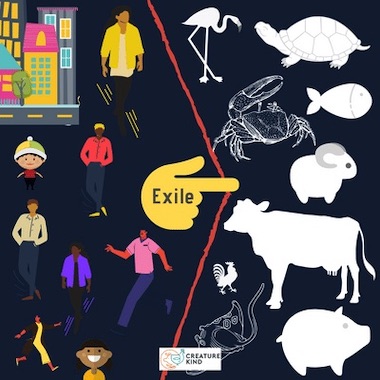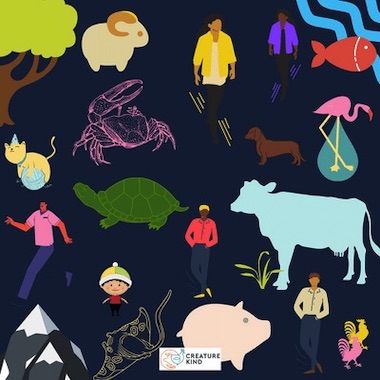
Reflections On COVID-19: Suffering From Exile
Animals: Tradition - Philosophy - Religion
FROM Ashley
Lewis, Creature Kind
April 2020
If we were to take seriously the types of community modeled in the biblical narrative, we would find ourselves connected with animals in our day-to-day realities more than most of us currently are.... Societal distance from animals has become the norm in the global West and in many other nations that take part in industrialized treatment of animals.


Throughout scripture, human and non-human animals are bound up in each
other’s lives. In the Garden of Eden, animals and humans shared the
experiences of creation and vocation. Aside from immediate family, Noah’s
only companions on the ark were animal-kind. From Abraham to Joseph, sheep
and goats are a constant. Wherever the family traveled, so went the
livestock. When Moses led a revolution against Pharaoh, the Israelites and
their animals caravanned out of Egypt together by God’s saving action. When
Moses translated the law from God to Israel, the law did not only hold
humans accountable, but non-humans as well. When God spared Nineveh, much to
the prophet Jonah’s dismay, it was out of concern for an entire city of
120,000 people, and “also many animals.” When the Old Testament Prophets
called for justice and deliverance, their message extended to all living
members of the community and often to the occupants of the nearby wilderness
as well. The Wisdom books, the Psalms, and even the New Testament are filled
with lessons about the shared lives of humans and non-humans. All of this,
plus my own instinctual sense of wonder and attraction to the
other-than-human world, tells me that God’s expectation for humans and
animals is to be in community together.
If we were to take seriously the types of community modeled in the biblical
narrative, we would find ourselves connected with animals in our day-to-day
realities more than most of us currently are.
The average U.S. citizen is several steps removed from all other kinds of
animals, aside from pets and companion animals. We will muse at them when
they are domesticated by a zoo, or are displayed for entertainment at theme
parks, or are part of a cultural excursion, regardless of whether or not the
habitat is natural for them. We may come close to encountering creatures
considered “wild” outside our homes, on hikes, or in parks, but when these
animals cross the line into our neighborhoods, they’re considered pests or
threats to society and must be kept at bay through trapping, baiting, or
shooting. Animals outside our homes are barely tolerable.
The vast majority of land animals on our planet are livestock, and these are
animals we almost never see, unless we seek them out. Each year around the
world, 70 billion land animals are killed for food. Aquatic animal lives
used for food cannot even be counted, though the weight is around 160
billion pounds per year. (1) Animals that are used for food far out-number
any other group of animals in the world, even humans, and yet the industrial
operations responsible for these animals remain entirely out of sight. The
average consumer need never consider what sort of life these creatures
lived, and in fact, the success of the food industry requires exactly that –
a lack of consideration, a veil of isolation.
Societal distance from animals has become the norm in the global West and in
many other nations that take part in industrialized treatment of animals.
The more I think about it, the more this separation feels like exile – a
forced outing of one group by a more powerful entity, which often involves
relocating the less powerful group under harsh conditions without
consideration for that population’s preferred ways of being. In biblical
terms, exile could mean leaving a place once thought of as home, being
separated from family and friends, living in lands that are harsh and
unfruitful, suffering loss of relationships – or all of these. Walter
Brueggemann says, “Exile is understood as a consequence of imperial policy
designed to establish new political and economic order in a subjugated
realm.” (2) Animal-kind has been continually relocated against their will
because of imperial policy. Our contemporary ways of life require that
animals be exiled from our human communities, almost always out of the
public’s view.
Exile is common in the biblical narrative for both humans and non-humans;
but the key difference between the exile of scripture and the exile
experienced today is that people and animals are exiled together in the
Bible. As they wait expectantly for reconciliation with God and with their
homeland, all creature-kind experience the hardship of exile as one
community – undergoing transitions and adapting to a new life while bearing
the burdens, stresses, and sorrow that come from isolation and separation.
They do what they can to live fruitful lives during ambiguous times, relying
on one another to survive.
Exile is something over which God laments. Living in a state of perpetual
discomfort and fear of the unknown prevents creatures from worshipping their
Creator in the way they were meant to. Until reconciliation occurs and a
restoration of abundant communal life can take place, God provides; but a
feeling of longing is to be expected for those in exile. We know that humans
are not unique in this. Animals who are lonely, separated from loved ones,
or who must be relocated to a new environment demonstrate that they feel
stress and depression. They also show joy when they’re reunited with what
they’ve missed.
As I remain home for the twelfth day of isolation, exile seems accurate to
describe how I feel. In exile, we suffer from loss of community, grieve
experiences we will never have, and we may be forced to ride out the wave of
uncertainty in a place we do not call home. Rather than attending seminary
classes on campus with friends, classmates, and professors, I must complete
all schoolwork alone, from a computer. Rather than physically stepping into
shared spaces of work, leisure, worship, and community, I try to connect
with others through video-conferencing and social media. Rather than having
predictable income, my husband and I realize that eventually our money will
run out. I’m grateful that I have a level of comfort and cushion during this
time – including more-than-adequate shelter, food, entertainment, health,
and companionship. I recognize many do not have access to these privileges.
God’s people and creatures throughout history, and even still today, have
been violently and traumatically thrown into chaos in a way that I have
never known. My social isolation is merely an entry point through which I
can imagine how oppressive communal displacement may feel.
The irony of this exile is that it may have been caused by society’s desire
to exile animals by sending them to hidden and unnatural places. COVID-19,
like many other bacteria and viruses that sicken people around the world
every day, most likely developed in an environment of mass animal
confinement. The virus is thought to have evolved in an exotic animal market
where animals of all kinds are kept in crowded, stressful, and unsanitary
conditions by handlers and hunters who experience their own financial exile
in an imperialistic world and must engage in this trade to provide for their
families. (3) The human desire to keep animals in places where they do not
belong – whether in plain sight in a market or zoo, or hidden far away from
the public in a factory farm or testing laboratory – has not only placed the
burden of exile on the animals, but has brought on the exile of social
distancing and isolation in which we find ourselves today.
In a way, our human systems have exiled us into this; and while isolation
may be necessary for a time, exile only generates more exile. In this
ambiguous time, I find a challenge: to practice the kind of hope that the
biblical Prophets had when they too faced unending exile. I return to the
words of Walter Brueggemann:
The remarkable act of hope that permeates the Old Testament lies in the fact
that the promises Israel heard and remembered link together the character
and intent of YHWH, the creator of heaven and earth, with the concrete
material reality of the world. YHWH’s promises characteristically do not
concern escape from the world but transformation within it…. [The prophetic
promises] are not predictions but are rather acts of faithful imagination
that dare to anticipate new futures on the bases of what YHWH has done in
the past. (4)
I dare to imagine healthy, holistic communities, where no person or animal
is sent away because of speciesism, classism, racism, or any other category
of belonging. This creature-kind community means every creature engages in
the fullness of relationship to God and their neighbors, while contributing
to the project of ushering in the New Creation. The example of Jesus – who
lived and died as an earthly creature so that we earthlings could be forever
united with the Triune God – allows me to commit an irresponsible act of
faithful imagination, to dream of a time when exile will no longer
impoverish the lives of our fellow earthly creatures and when illness will
not take the lives of the ones we love.
During this time of isolation, I invite you to join me in hoping for an end to exile – for all creaturekind – so that our lives may be bound up beautifully in each other, in a community redeemed by the grace of God and emboldened by Christ’s love.
Sources:
- Yinon M. Bar-On, Rob Phillips, and Ron Milo, “The biomass distribution on Earth,” PNAS June 19, 2018 115 (25) 6506-6511. Edited by Paul G. Falkowski, Rutgers, The State University of New Jersey, New Brunswick, NJ, first published May 21, 2018. https://doi.org/10.1073/pnas.1711842115. Cows, pigs, goats, and sheep used for food make up 60% of all mammal biomass on the planet. Poultry birds like chickens and turkeys equal 70% of the planet’s bird biomass.
- Walter Brueggemann, Reverberations of Faith: A Theological Handbook of Old Testament Themes, (Louisville: Westminster John Knox Press, 2002), 70.
- Holly Secon, Aylin Woodward, and Dave Mosher, “A comprehensive timeline of the new coronavirus pandemic from China’s first COVID-19 case to the present.” in Business Insider Updated March 24, 2020.
- Brueggemann, 101.
Return to Animals: Tradition - Philosophy - Religion
Read more at
COVID-19/Coronavirus Articles Directory








